Research Skills for Academic Study: Impact of Big Data & IT on Society
VerifiedAdded on 2023/06/09
|8
|2190
|218
Report
AI Summary
This report examines the impact of big data and information technology on society, focusing on research skills for academic study. It differentiates between primary and secondary data sources, highlighting the relevance of primary data for understanding the current impact of technology. The report addresses data collection issues, emphasizing anonymity, confidentiality, and cybersecurity. It also reflects on the suitability of survey questionnaires for primary data collection. Academic sources are evaluated for credibility and ranked based on their relevance, with justifications for their inclusion and ranking. The report concludes that effective research requires careful data collection and credible resources, emphasizing the importance of using appropriate methods for investigation to ensure quality research outcomes. Desklib provides similar academic resources for students.
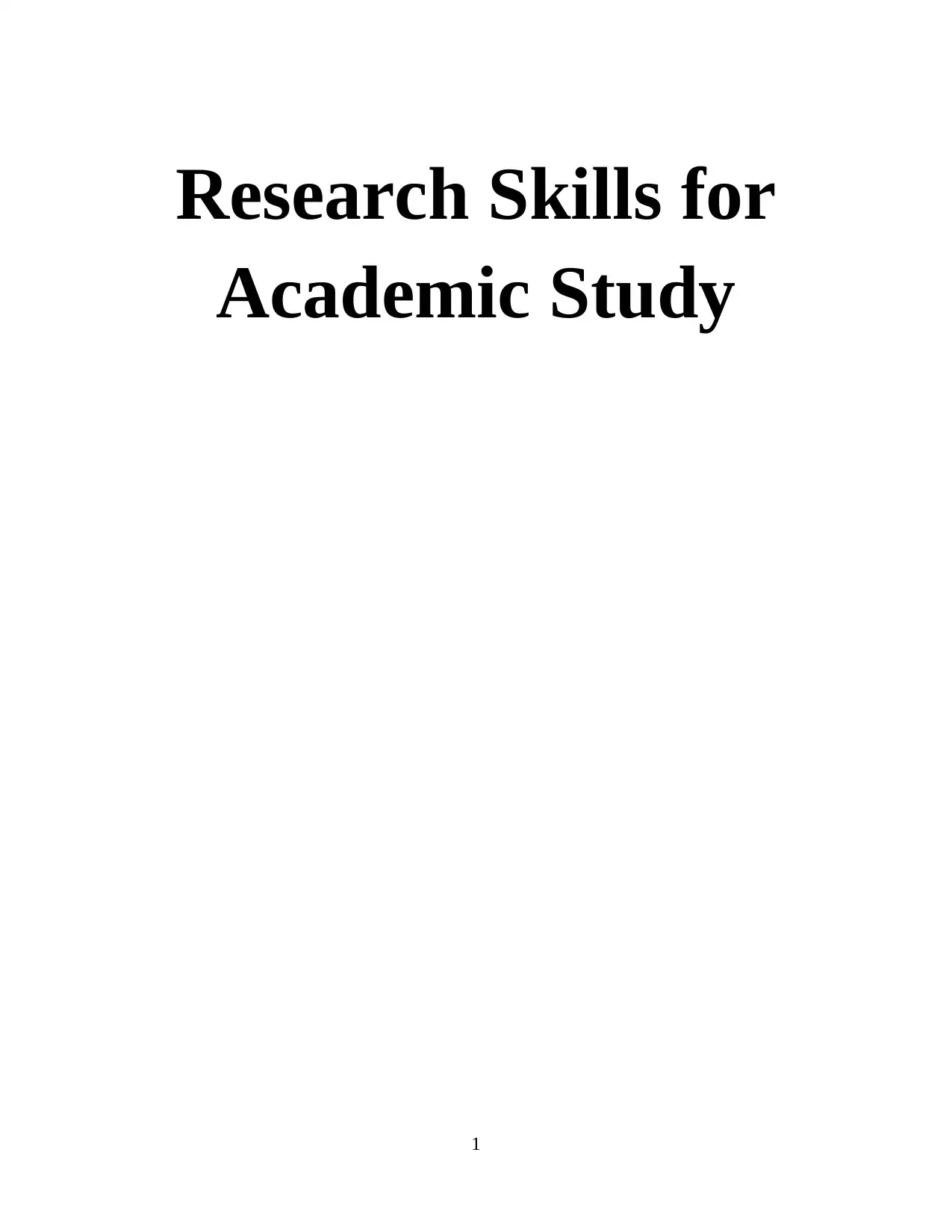
Research Skills for
Academic Study
1
Academic Study
1
Paraphrase This Document
Need a fresh take? Get an instant paraphrase of this document with our AI Paraphraser
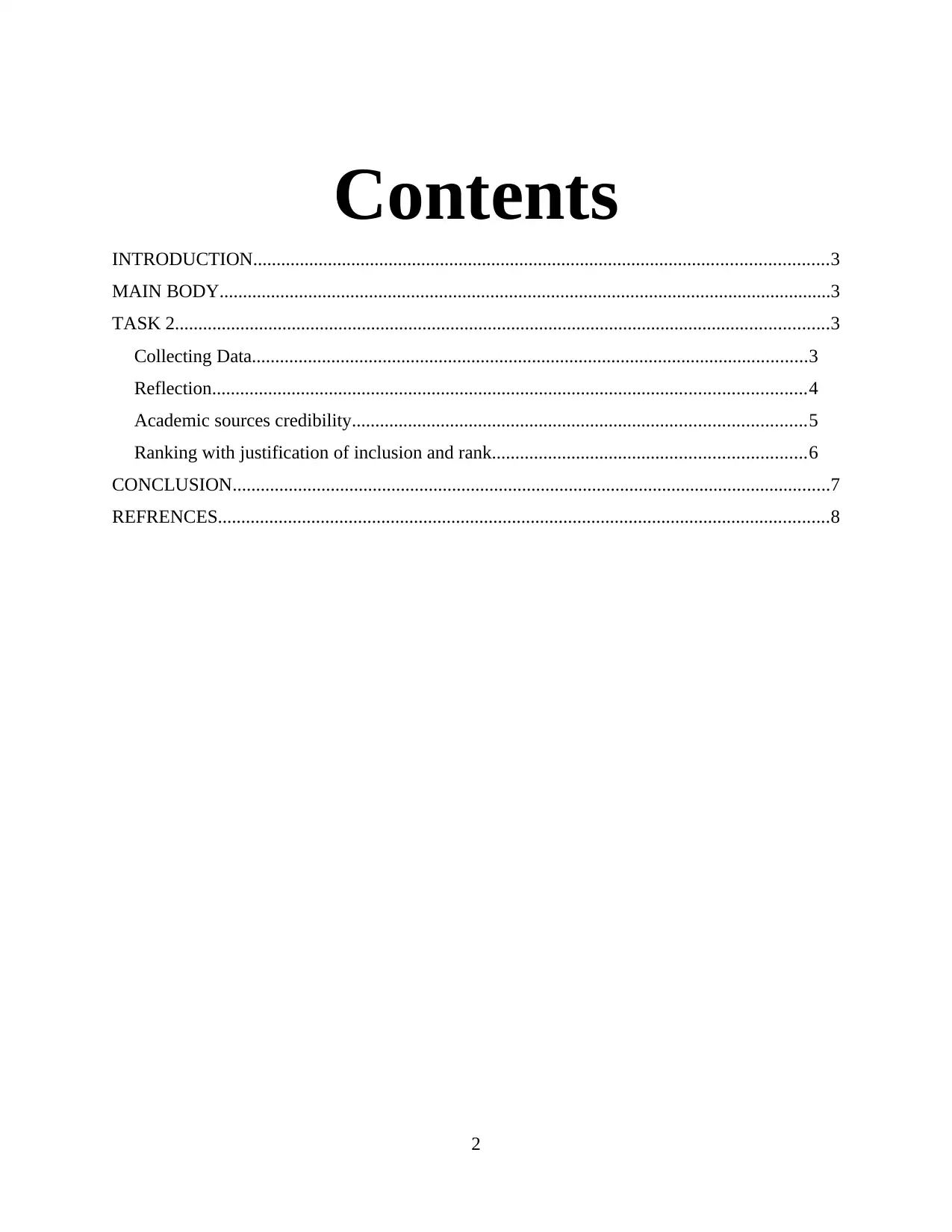
Contents
INTRODUCTION...........................................................................................................................3
MAIN BODY...................................................................................................................................3
TASK 2............................................................................................................................................3
Collecting Data.......................................................................................................................3
Reflection...............................................................................................................................4
Academic sources credibility.................................................................................................5
Ranking with justification of inclusion and rank...................................................................6
CONCLUSION................................................................................................................................7
REFRENCES...................................................................................................................................8
2
INTRODUCTION...........................................................................................................................3
MAIN BODY...................................................................................................................................3
TASK 2............................................................................................................................................3
Collecting Data.......................................................................................................................3
Reflection...............................................................................................................................4
Academic sources credibility.................................................................................................5
Ranking with justification of inclusion and rank...................................................................6
CONCLUSION................................................................................................................................7
REFRENCES...................................................................................................................................8
2
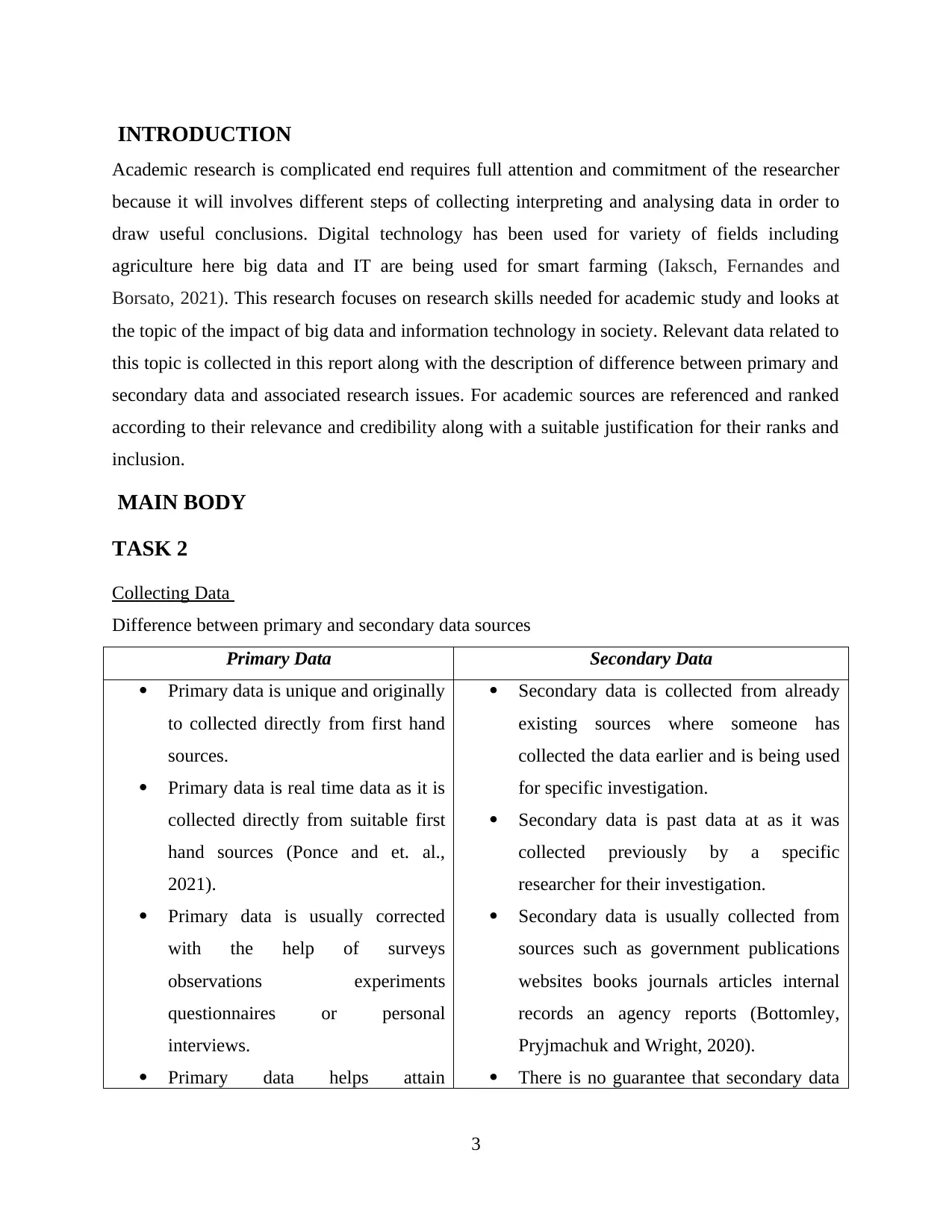
INTRODUCTION
Academic research is complicated end requires full attention and commitment of the researcher
because it will involves different steps of collecting interpreting and analysing data in order to
draw useful conclusions. Digital technology has been used for variety of fields including
agriculture here big data and IT are being used for smart farming (Iaksch, Fernandes and
Borsato, 2021). This research focuses on research skills needed for academic study and looks at
the topic of the impact of big data and information technology in society. Relevant data related to
this topic is collected in this report along with the description of difference between primary and
secondary data and associated research issues. For academic sources are referenced and ranked
according to their relevance and credibility along with a suitable justification for their ranks and
inclusion.
MAIN BODY
TASK 2
Collecting Data
Difference between primary and secondary data sources
Primary Data Secondary Data
Primary data is unique and originally
to collected directly from first hand
sources.
Primary data is real time data as it is
collected directly from suitable first
hand sources (Ponce and et. al.,
2021).
Primary data is usually corrected
with the help of surveys
observations experiments
questionnaires or personal
interviews.
Primary data helps attain
Secondary data is collected from already
existing sources where someone has
collected the data earlier and is being used
for specific investigation.
Secondary data is past data at as it was
collected previously by a specific
researcher for their investigation.
Secondary data is usually collected from
sources such as government publications
websites books journals articles internal
records an agency reports (Bottomley,
Pryjmachuk and Wright, 2020).
There is no guarantee that secondary data
3
Academic research is complicated end requires full attention and commitment of the researcher
because it will involves different steps of collecting interpreting and analysing data in order to
draw useful conclusions. Digital technology has been used for variety of fields including
agriculture here big data and IT are being used for smart farming (Iaksch, Fernandes and
Borsato, 2021). This research focuses on research skills needed for academic study and looks at
the topic of the impact of big data and information technology in society. Relevant data related to
this topic is collected in this report along with the description of difference between primary and
secondary data and associated research issues. For academic sources are referenced and ranked
according to their relevance and credibility along with a suitable justification for their ranks and
inclusion.
MAIN BODY
TASK 2
Collecting Data
Difference between primary and secondary data sources
Primary Data Secondary Data
Primary data is unique and originally
to collected directly from first hand
sources.
Primary data is real time data as it is
collected directly from suitable first
hand sources (Ponce and et. al.,
2021).
Primary data is usually corrected
with the help of surveys
observations experiments
questionnaires or personal
interviews.
Primary data helps attain
Secondary data is collected from already
existing sources where someone has
collected the data earlier and is being used
for specific investigation.
Secondary data is past data at as it was
collected previously by a specific
researcher for their investigation.
Secondary data is usually collected from
sources such as government publications
websites books journals articles internal
records an agency reports (Bottomley,
Pryjmachuk and Wright, 2020).
There is no guarantee that secondary data
3
⊘ This is a preview!⊘
Do you want full access?
Subscribe today to unlock all pages.

Trusted by 1+ million students worldwide
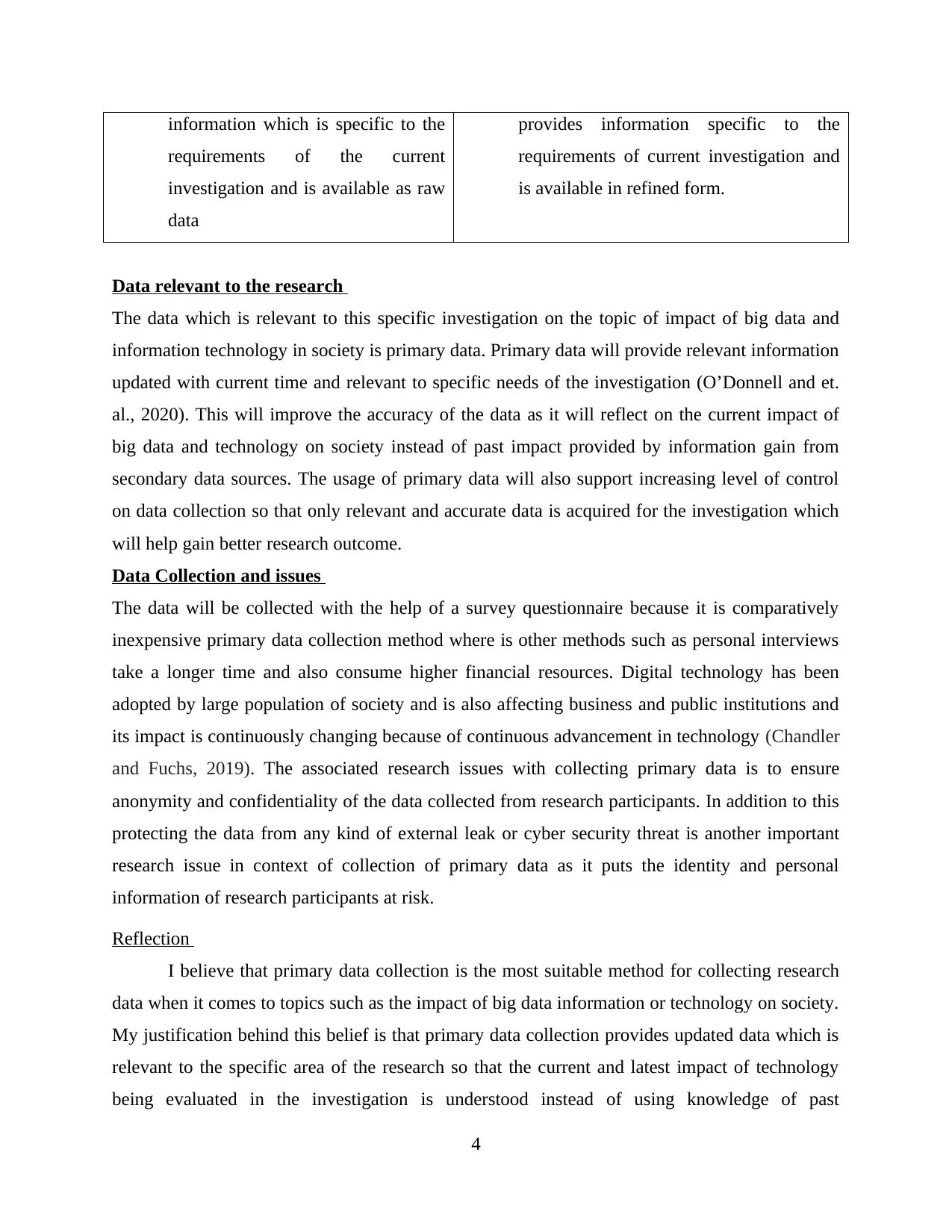
information which is specific to the
requirements of the current
investigation and is available as raw
data
provides information specific to the
requirements of current investigation and
is available in refined form.
Data relevant to the research
The data which is relevant to this specific investigation on the topic of impact of big data and
information technology in society is primary data. Primary data will provide relevant information
updated with current time and relevant to specific needs of the investigation (O’Donnell and et.
al., 2020). This will improve the accuracy of the data as it will reflect on the current impact of
big data and technology on society instead of past impact provided by information gain from
secondary data sources. The usage of primary data will also support increasing level of control
on data collection so that only relevant and accurate data is acquired for the investigation which
will help gain better research outcome.
Data Collection and issues
The data will be collected with the help of a survey questionnaire because it is comparatively
inexpensive primary data collection method where is other methods such as personal interviews
take a longer time and also consume higher financial resources. Digital technology has been
adopted by large population of society and is also affecting business and public institutions and
its impact is continuously changing because of continuous advancement in technology (Chandler
and Fuchs, 2019). The associated research issues with collecting primary data is to ensure
anonymity and confidentiality of the data collected from research participants. In addition to this
protecting the data from any kind of external leak or cyber security threat is another important
research issue in context of collection of primary data as it puts the identity and personal
information of research participants at risk.
Reflection
I believe that primary data collection is the most suitable method for collecting research
data when it comes to topics such as the impact of big data information or technology on society.
My justification behind this belief is that primary data collection provides updated data which is
relevant to the specific area of the research so that the current and latest impact of technology
being evaluated in the investigation is understood instead of using knowledge of past
4
requirements of the current
investigation and is available as raw
data
provides information specific to the
requirements of current investigation and
is available in refined form.
Data relevant to the research
The data which is relevant to this specific investigation on the topic of impact of big data and
information technology in society is primary data. Primary data will provide relevant information
updated with current time and relevant to specific needs of the investigation (O’Donnell and et.
al., 2020). This will improve the accuracy of the data as it will reflect on the current impact of
big data and technology on society instead of past impact provided by information gain from
secondary data sources. The usage of primary data will also support increasing level of control
on data collection so that only relevant and accurate data is acquired for the investigation which
will help gain better research outcome.
Data Collection and issues
The data will be collected with the help of a survey questionnaire because it is comparatively
inexpensive primary data collection method where is other methods such as personal interviews
take a longer time and also consume higher financial resources. Digital technology has been
adopted by large population of society and is also affecting business and public institutions and
its impact is continuously changing because of continuous advancement in technology (Chandler
and Fuchs, 2019). The associated research issues with collecting primary data is to ensure
anonymity and confidentiality of the data collected from research participants. In addition to this
protecting the data from any kind of external leak or cyber security threat is another important
research issue in context of collection of primary data as it puts the identity and personal
information of research participants at risk.
Reflection
I believe that primary data collection is the most suitable method for collecting research
data when it comes to topics such as the impact of big data information or technology on society.
My justification behind this belief is that primary data collection provides updated data which is
relevant to the specific area of the research so that the current and latest impact of technology
being evaluated in the investigation is understood instead of using knowledge of past
4
Paraphrase This Document
Need a fresh take? Get an instant paraphrase of this document with our AI Paraphraser
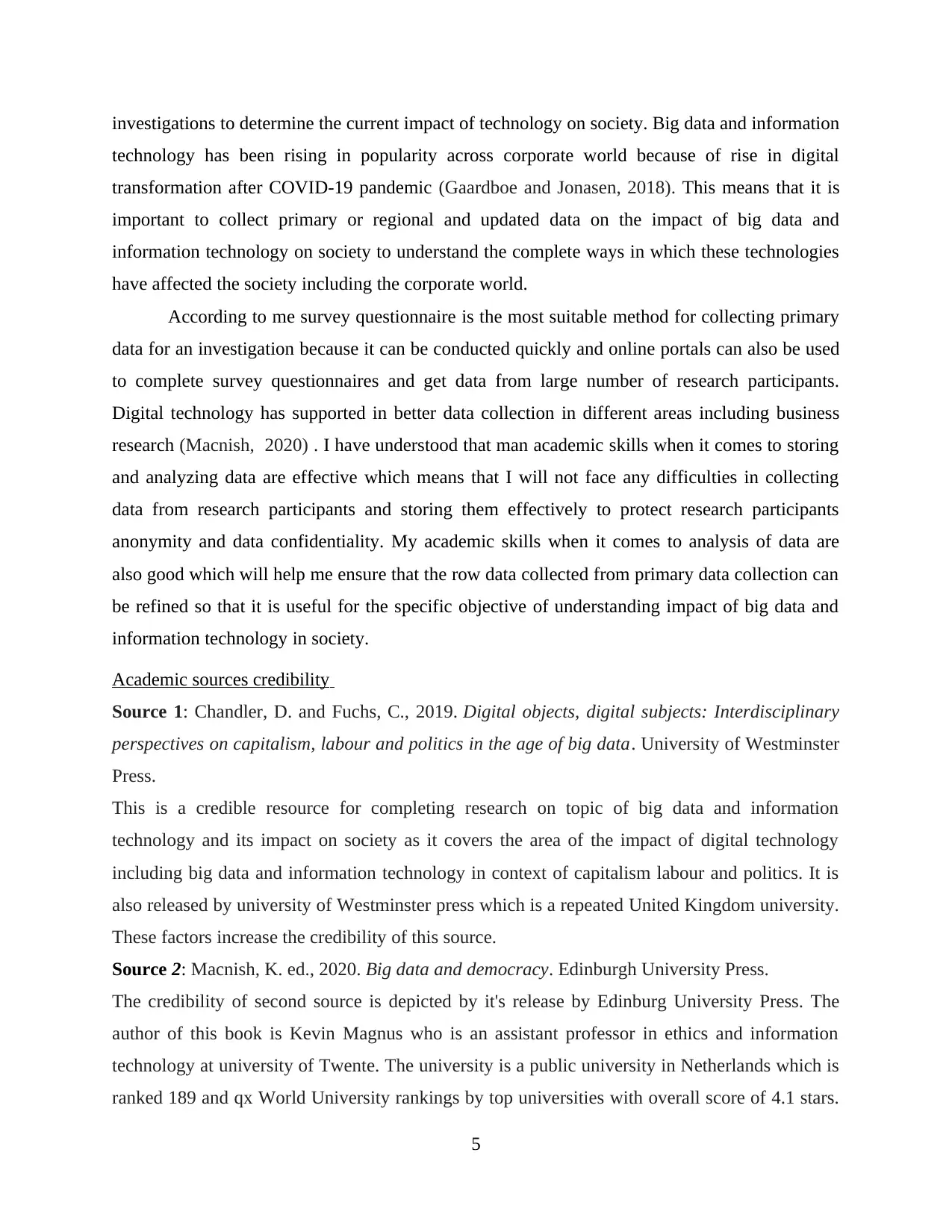
investigations to determine the current impact of technology on society. Big data and information
technology has been rising in popularity across corporate world because of rise in digital
transformation after COVID-19 pandemic (Gaardboe and Jonasen, 2018). This means that it is
important to collect primary or regional and updated data on the impact of big data and
information technology on society to understand the complete ways in which these technologies
have affected the society including the corporate world.
According to me survey questionnaire is the most suitable method for collecting primary
data for an investigation because it can be conducted quickly and online portals can also be used
to complete survey questionnaires and get data from large number of research participants.
Digital technology has supported in better data collection in different areas including business
research (Macnish, 2020) . I have understood that man academic skills when it comes to storing
and analyzing data are effective which means that I will not face any difficulties in collecting
data from research participants and storing them effectively to protect research participants
anonymity and data confidentiality. My academic skills when it comes to analysis of data are
also good which will help me ensure that the row data collected from primary data collection can
be refined so that it is useful for the specific objective of understanding impact of big data and
information technology in society.
Academic sources credibility
Source 1: Chandler, D. and Fuchs, C., 2019. Digital objects, digital subjects: Interdisciplinary
perspectives on capitalism, labour and politics in the age of big data. University of Westminster
Press.
This is a credible resource for completing research on topic of big data and information
technology and its impact on society as it covers the area of the impact of digital technology
including big data and information technology in context of capitalism labour and politics. It is
also released by university of Westminster press which is a repeated United Kingdom university.
These factors increase the credibility of this source.
Source 2: Macnish, K. ed., 2020. Big data and democracy. Edinburgh University Press.
The credibility of second source is depicted by it's release by Edinburg University Press. The
author of this book is Kevin Magnus who is an assistant professor in ethics and information
technology at university of Twente. The university is a public university in Netherlands which is
ranked 189 and qx World University rankings by top universities with overall score of 4.1 stars.
5
technology has been rising in popularity across corporate world because of rise in digital
transformation after COVID-19 pandemic (Gaardboe and Jonasen, 2018). This means that it is
important to collect primary or regional and updated data on the impact of big data and
information technology on society to understand the complete ways in which these technologies
have affected the society including the corporate world.
According to me survey questionnaire is the most suitable method for collecting primary
data for an investigation because it can be conducted quickly and online portals can also be used
to complete survey questionnaires and get data from large number of research participants.
Digital technology has supported in better data collection in different areas including business
research (Macnish, 2020) . I have understood that man academic skills when it comes to storing
and analyzing data are effective which means that I will not face any difficulties in collecting
data from research participants and storing them effectively to protect research participants
anonymity and data confidentiality. My academic skills when it comes to analysis of data are
also good which will help me ensure that the row data collected from primary data collection can
be refined so that it is useful for the specific objective of understanding impact of big data and
information technology in society.
Academic sources credibility
Source 1: Chandler, D. and Fuchs, C., 2019. Digital objects, digital subjects: Interdisciplinary
perspectives on capitalism, labour and politics in the age of big data. University of Westminster
Press.
This is a credible resource for completing research on topic of big data and information
technology and its impact on society as it covers the area of the impact of digital technology
including big data and information technology in context of capitalism labour and politics. It is
also released by university of Westminster press which is a repeated United Kingdom university.
These factors increase the credibility of this source.
Source 2: Macnish, K. ed., 2020. Big data and democracy. Edinburgh University Press.
The credibility of second source is depicted by it's release by Edinburg University Press. The
author of this book is Kevin Magnus who is an assistant professor in ethics and information
technology at university of Twente. The university is a public university in Netherlands which is
ranked 189 and qx World University rankings by top universities with overall score of 4.1 stars.
5
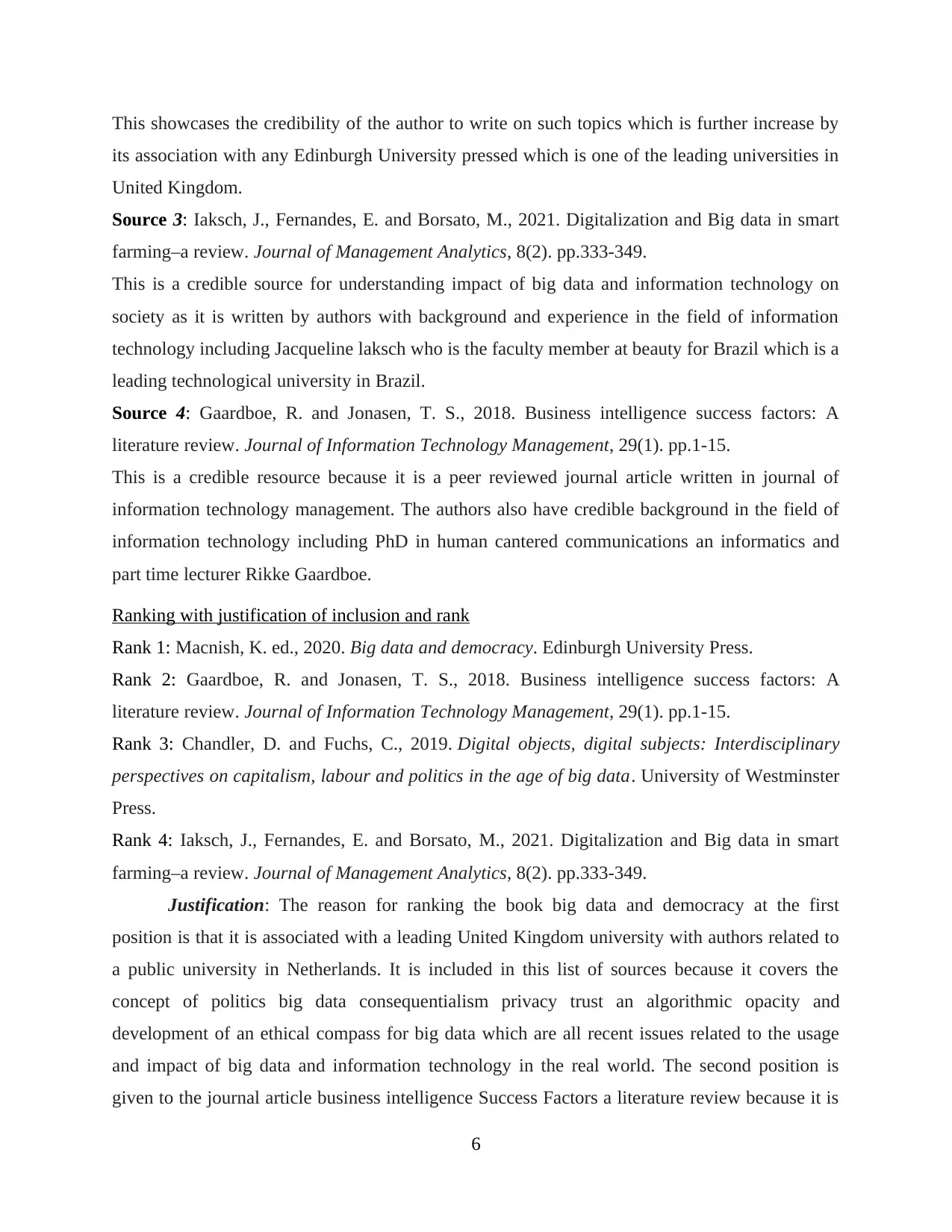
This showcases the credibility of the author to write on such topics which is further increase by
its association with any Edinburgh University pressed which is one of the leading universities in
United Kingdom.
Source 3: Iaksch, J., Fernandes, E. and Borsato, M., 2021. Digitalization and Big data in smart
farming–a review. Journal of Management Analytics, 8(2). pp.333-349.
This is a credible source for understanding impact of big data and information technology on
society as it is written by authors with background and experience in the field of information
technology including Jacqueline laksch who is the faculty member at beauty for Brazil which is a
leading technological university in Brazil.
Source 4: Gaardboe, R. and Jonasen, T. S., 2018. Business intelligence success factors: A
literature review. Journal of Information Technology Management, 29(1). pp.1-15.
This is a credible resource because it is a peer reviewed journal article written in journal of
information technology management. The authors also have credible background in the field of
information technology including PhD in human cantered communications an informatics and
part time lecturer Rikke Gaardboe.
Ranking with justification of inclusion and rank
Rank 1: Macnish, K. ed., 2020. Big data and democracy. Edinburgh University Press.
Rank 2: Gaardboe, R. and Jonasen, T. S., 2018. Business intelligence success factors: A
literature review. Journal of Information Technology Management, 29(1). pp.1-15.
Rank 3: Chandler, D. and Fuchs, C., 2019. Digital objects, digital subjects: Interdisciplinary
perspectives on capitalism, labour and politics in the age of big data. University of Westminster
Press.
Rank 4: Iaksch, J., Fernandes, E. and Borsato, M., 2021. Digitalization and Big data in smart
farming–a review. Journal of Management Analytics, 8(2). pp.333-349.
Justification: The reason for ranking the book big data and democracy at the first
position is that it is associated with a leading United Kingdom university with authors related to
a public university in Netherlands. It is included in this list of sources because it covers the
concept of politics big data consequentialism privacy trust an algorithmic opacity and
development of an ethical compass for big data which are all recent issues related to the usage
and impact of big data and information technology in the real world. The second position is
given to the journal article business intelligence Success Factors a literature review because it is
6
its association with any Edinburgh University pressed which is one of the leading universities in
United Kingdom.
Source 3: Iaksch, J., Fernandes, E. and Borsato, M., 2021. Digitalization and Big data in smart
farming–a review. Journal of Management Analytics, 8(2). pp.333-349.
This is a credible source for understanding impact of big data and information technology on
society as it is written by authors with background and experience in the field of information
technology including Jacqueline laksch who is the faculty member at beauty for Brazil which is a
leading technological university in Brazil.
Source 4: Gaardboe, R. and Jonasen, T. S., 2018. Business intelligence success factors: A
literature review. Journal of Information Technology Management, 29(1). pp.1-15.
This is a credible resource because it is a peer reviewed journal article written in journal of
information technology management. The authors also have credible background in the field of
information technology including PhD in human cantered communications an informatics and
part time lecturer Rikke Gaardboe.
Ranking with justification of inclusion and rank
Rank 1: Macnish, K. ed., 2020. Big data and democracy. Edinburgh University Press.
Rank 2: Gaardboe, R. and Jonasen, T. S., 2018. Business intelligence success factors: A
literature review. Journal of Information Technology Management, 29(1). pp.1-15.
Rank 3: Chandler, D. and Fuchs, C., 2019. Digital objects, digital subjects: Interdisciplinary
perspectives on capitalism, labour and politics in the age of big data. University of Westminster
Press.
Rank 4: Iaksch, J., Fernandes, E. and Borsato, M., 2021. Digitalization and Big data in smart
farming–a review. Journal of Management Analytics, 8(2). pp.333-349.
Justification: The reason for ranking the book big data and democracy at the first
position is that it is associated with a leading United Kingdom university with authors related to
a public university in Netherlands. It is included in this list of sources because it covers the
concept of politics big data consequentialism privacy trust an algorithmic opacity and
development of an ethical compass for big data which are all recent issues related to the usage
and impact of big data and information technology in the real world. The second position is
given to the journal article business intelligence Success Factors a literature review because it is
6
⊘ This is a preview!⊘
Do you want full access?
Subscribe today to unlock all pages.

Trusted by 1+ million students worldwide
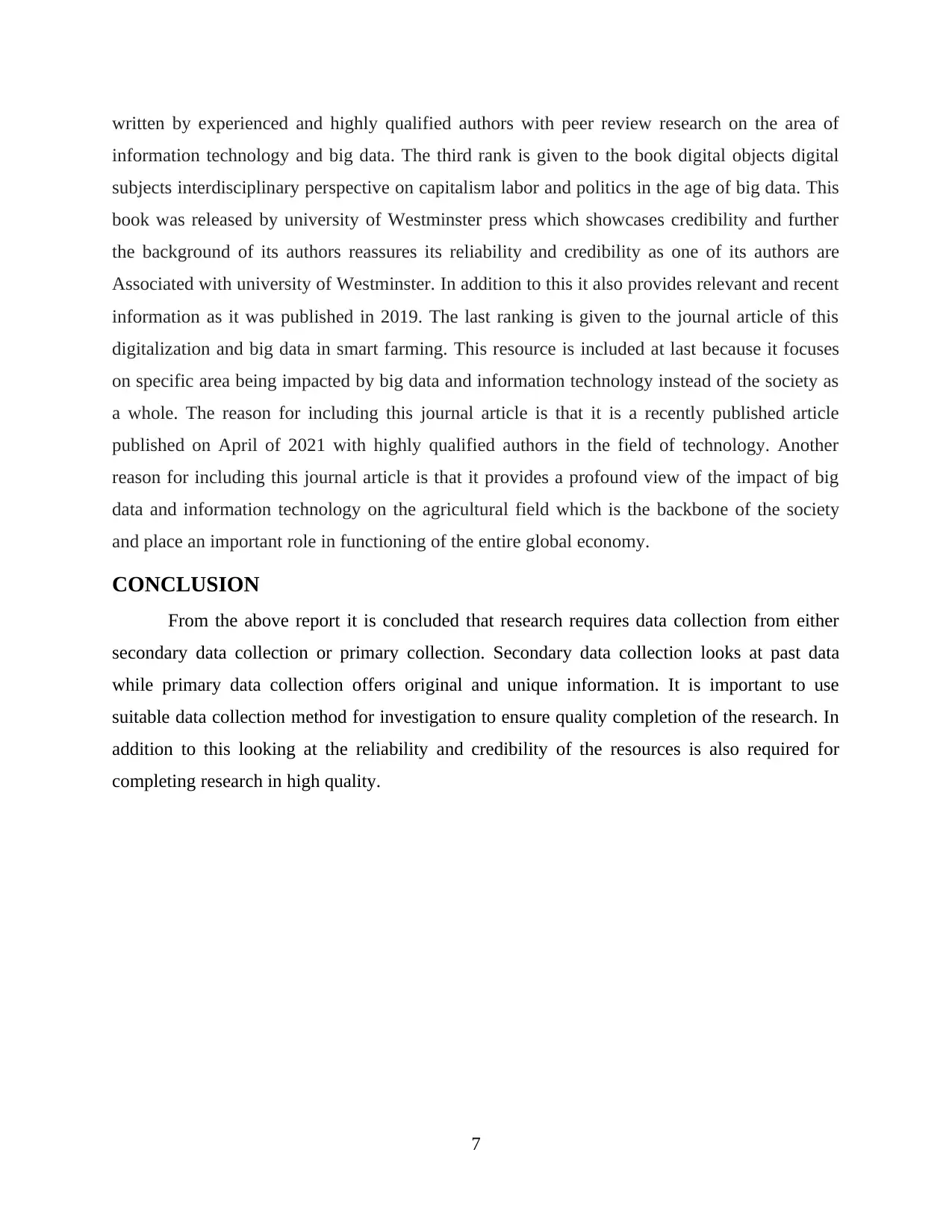
written by experienced and highly qualified authors with peer review research on the area of
information technology and big data. The third rank is given to the book digital objects digital
subjects interdisciplinary perspective on capitalism labor and politics in the age of big data. This
book was released by university of Westminster press which showcases credibility and further
the background of its authors reassures its reliability and credibility as one of its authors are
Associated with university of Westminster. In addition to this it also provides relevant and recent
information as it was published in 2019. The last ranking is given to the journal article of this
digitalization and big data in smart farming. This resource is included at last because it focuses
on specific area being impacted by big data and information technology instead of the society as
a whole. The reason for including this journal article is that it is a recently published article
published on April of 2021 with highly qualified authors in the field of technology. Another
reason for including this journal article is that it provides a profound view of the impact of big
data and information technology on the agricultural field which is the backbone of the society
and place an important role in functioning of the entire global economy.
CONCLUSION
From the above report it is concluded that research requires data collection from either
secondary data collection or primary collection. Secondary data collection looks at past data
while primary data collection offers original and unique information. It is important to use
suitable data collection method for investigation to ensure quality completion of the research. In
addition to this looking at the reliability and credibility of the resources is also required for
completing research in high quality.
7
information technology and big data. The third rank is given to the book digital objects digital
subjects interdisciplinary perspective on capitalism labor and politics in the age of big data. This
book was released by university of Westminster press which showcases credibility and further
the background of its authors reassures its reliability and credibility as one of its authors are
Associated with university of Westminster. In addition to this it also provides relevant and recent
information as it was published in 2019. The last ranking is given to the journal article of this
digitalization and big data in smart farming. This resource is included at last because it focuses
on specific area being impacted by big data and information technology instead of the society as
a whole. The reason for including this journal article is that it is a recently published article
published on April of 2021 with highly qualified authors in the field of technology. Another
reason for including this journal article is that it provides a profound view of the impact of big
data and information technology on the agricultural field which is the backbone of the society
and place an important role in functioning of the entire global economy.
CONCLUSION
From the above report it is concluded that research requires data collection from either
secondary data collection or primary collection. Secondary data collection looks at past data
while primary data collection offers original and unique information. It is important to use
suitable data collection method for investigation to ensure quality completion of the research. In
addition to this looking at the reliability and credibility of the resources is also required for
completing research in high quality.
7
Paraphrase This Document
Need a fresh take? Get an instant paraphrase of this document with our AI Paraphraser
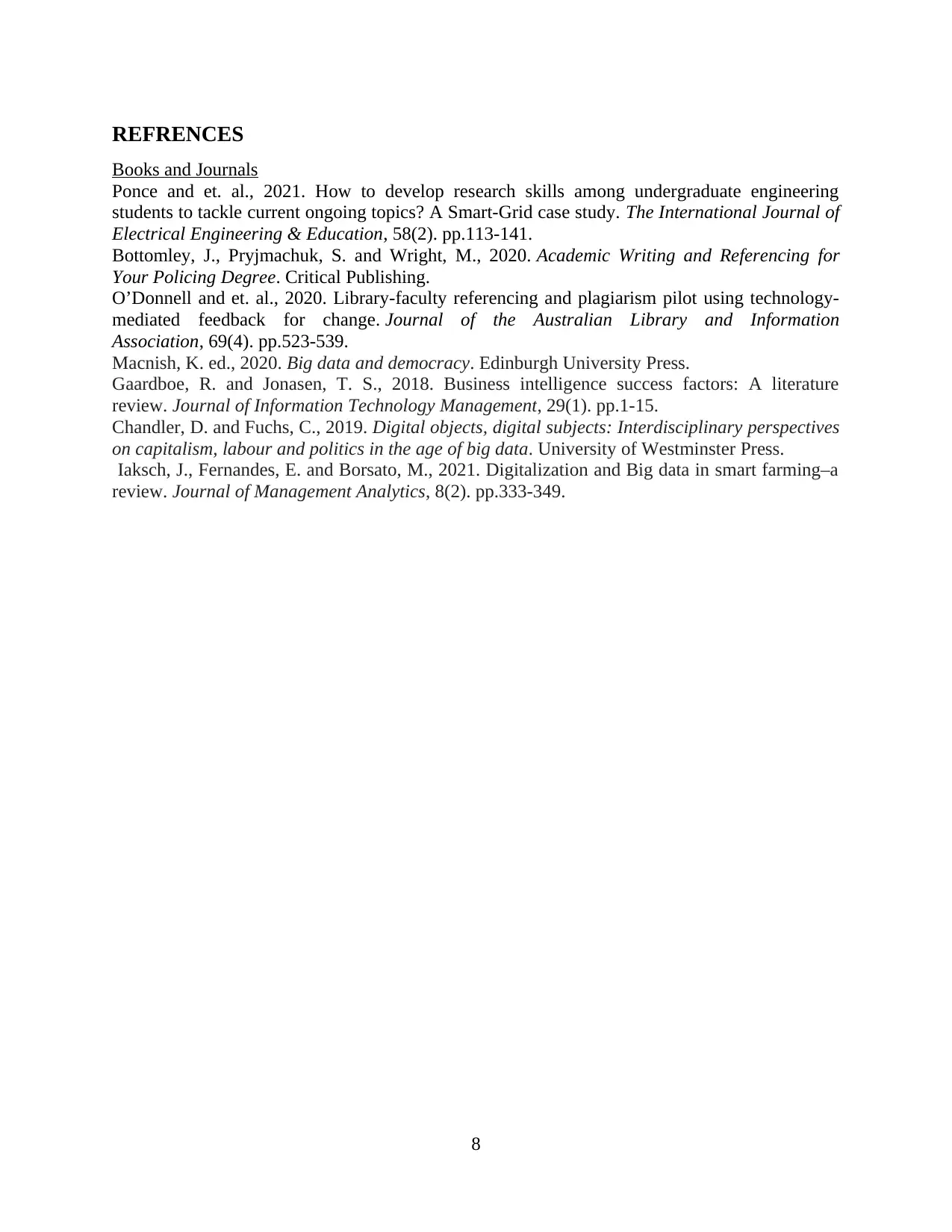
REFRENCES
Books and Journals
Ponce and et. al., 2021. How to develop research skills among undergraduate engineering
students to tackle current ongoing topics? A Smart-Grid case study. The International Journal of
Electrical Engineering & Education, 58(2). pp.113-141.
Bottomley, J., Pryjmachuk, S. and Wright, M., 2020. Academic Writing and Referencing for
Your Policing Degree. Critical Publishing.
O’Donnell and et. al., 2020. Library-faculty referencing and plagiarism pilot using technology-
mediated feedback for change. Journal of the Australian Library and Information
Association, 69(4). pp.523-539.
Macnish, K. ed., 2020. Big data and democracy. Edinburgh University Press.
Gaardboe, R. and Jonasen, T. S., 2018. Business intelligence success factors: A literature
review. Journal of Information Technology Management, 29(1). pp.1-15.
Chandler, D. and Fuchs, C., 2019. Digital objects, digital subjects: Interdisciplinary perspectives
on capitalism, labour and politics in the age of big data. University of Westminster Press.
Iaksch, J., Fernandes, E. and Borsato, M., 2021. Digitalization and Big data in smart farming–a
review. Journal of Management Analytics, 8(2). pp.333-349.
8
Books and Journals
Ponce and et. al., 2021. How to develop research skills among undergraduate engineering
students to tackle current ongoing topics? A Smart-Grid case study. The International Journal of
Electrical Engineering & Education, 58(2). pp.113-141.
Bottomley, J., Pryjmachuk, S. and Wright, M., 2020. Academic Writing and Referencing for
Your Policing Degree. Critical Publishing.
O’Donnell and et. al., 2020. Library-faculty referencing and plagiarism pilot using technology-
mediated feedback for change. Journal of the Australian Library and Information
Association, 69(4). pp.523-539.
Macnish, K. ed., 2020. Big data and democracy. Edinburgh University Press.
Gaardboe, R. and Jonasen, T. S., 2018. Business intelligence success factors: A literature
review. Journal of Information Technology Management, 29(1). pp.1-15.
Chandler, D. and Fuchs, C., 2019. Digital objects, digital subjects: Interdisciplinary perspectives
on capitalism, labour and politics in the age of big data. University of Westminster Press.
Iaksch, J., Fernandes, E. and Borsato, M., 2021. Digitalization and Big data in smart farming–a
review. Journal of Management Analytics, 8(2). pp.333-349.
8
1 out of 8
Related Documents
Your All-in-One AI-Powered Toolkit for Academic Success.
+13062052269
info@desklib.com
Available 24*7 on WhatsApp / Email
![[object Object]](/_next/static/media/star-bottom.7253800d.svg)
Unlock your academic potential
Copyright © 2020–2026 A2Z Services. All Rights Reserved. Developed and managed by ZUCOL.




